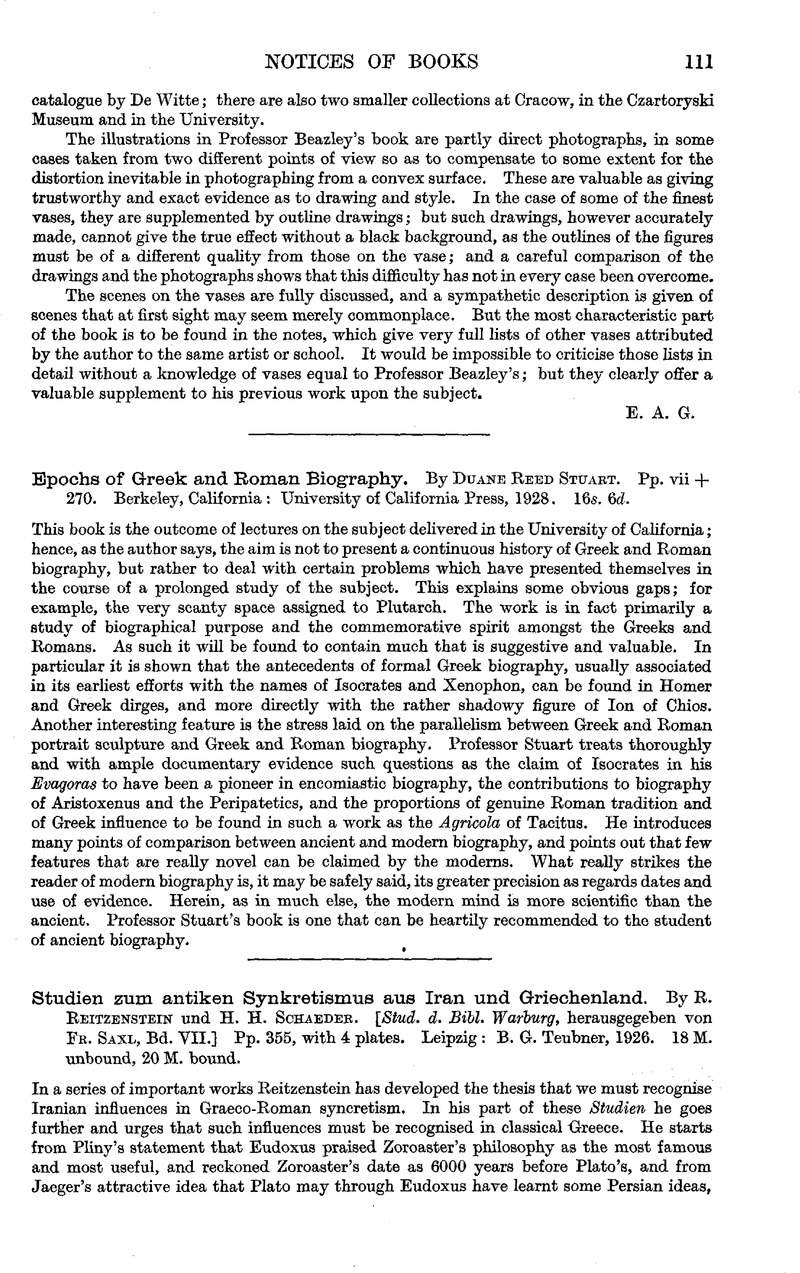Published online by Cambridge University Press: 23 December 2013

1 He supplements his exegesis in Gnomon, 1927, p. 266 ff.
2 Cf. Weber, W., Der Prophet und sein Gott, p. 104.Google Scholar
3 Ap. Procl. in R.P. II. 109 Kroll.
Note also the legend discussed by Sinko, Th., Eos, XXX. 109Google Scholar, of the visit of the Magi to Plato to learn from him, and the tale in Seneca, , Ep. 58. 31Google Scholar, of their accidental presence in Athens at the time of his death.
4 Damascius, , De primis principiis, 12Google Scholar; Lydus, Joannes, De mensibus, II, 2.Google Scholar
5 Reitzenstein, 15, 81; Scott, , Hermetica, II. 20 f.Google Scholar
6 This is not certain (cf. Schaeder, , Vortr. Warburg, 1924–5, 125 ff.Google Scholar); actual Manichee influence is almost out of the question on chronological grounds.
7 Great caution is here required in view of the complexity of men's ideas about the soul and its parts; cf. Moulton, J. H., Enc. Rel. Eth., VI. 117Google Scholar, and Reitzenstein, , Gnomon, 1927, 272 f.Google Scholar
8 Zeitschr. f. Indologie und Iranistik, II. 67, § 116.
9 Cf. the material given by Bousset, W., Arch. f. Rel., IV. 155 ff.Google Scholar
10 Cf. Söderblom, , Enc. Rel. Eth., II. 105 f.Google Scholar, for Persian prohibitions of asceticism and Lidzbarski, , Ginza, 50. 3 ff.Google Scholar, 224, 227 ff., for Mandaean sneers at Christian asceticism (with Peterson's, E. comments, Zeit. neut. Wiss., 1928, 70 fGoogle Scholar. Both Persians and Mandaeans praise ‘fasting from sin’). The disparagement of the body in Sap. Sal. 9. 15 is borrowed from Plato. Cf. in general Kroll, J., Lehren des Hermes, 269 ff.Google Scholar
10a So also Manichaeism.
11 Cf. Sallustius, πϵρὶ θϵῶν, xxi.
12 In § 18 this thought is curiously set side by side with the Jewish ‘Increase and multiply’; the wise man will know the truth and find freedom. Contrast II. 17 with its praise of procreation.
13 It may be due to some lost apocryphon about Adam or Noah. To look for Iranian colour in the end of Corpus Herm. I., the legitimisation of missionary work, is precarious; ![]() in § 32 is quite normal Greek, and need not have anything to do with hvareno. We may remark in passing that the cosmogony proper is handled with haste in § 11: this is no proper cosmogony, like the Dāmdād-Nask, but an explanation of the problem of man.
in § 32 is quite normal Greek, and need not have anything to do with hvareno. We may remark in passing that the cosmogony proper is handled with haste in § 11: this is no proper cosmogony, like the Dāmdād-Nask, but an explanation of the problem of man.
14 Dittenberger, , Orientis graeci inscr. sel., 383. 29 ff.Google Scholar
15 Preisigke, , Wōrterbuch, II. 773.Google Scholar
16 Cf. McCown's, C. C. excellent study, Harv. Theol. Rev., XVIII. 357 ff.Google Scholar
17 Perhaps called forth by the situation suggested by Scott, I. 61 ff. It should be noted that the repeated world catastrophes of the Ascl. are Greek rather than Iranian.
18 No doubt subsequent to Hesiod.
19 So Mazon, P., Hésiode; les travaux et les jours (1914), 89.Google Scholar This idea is not due to the analogy of the four seasons; their number was not so fixed at an early time.
20 It is to be feared that ![]() would have been called Stoic by some one but for its date.
would have been called Stoic by some one but for its date.
21 Cf. in general Casey, R. P., J.T.S., XXVII. 374 ff.Google Scholar; on the last point cf. Tertull., De ieiuniis 15Google Scholar, apud Iouem hodiernum de Pythagora haereticum.
22 Cl. Qu., 1926, 41 f.
23 Hippolyt. V. 9. 7 speaks of it as produced in theatres.
24 Cf. contra Dibelius, M., Theol. Lit.-Zeit., 1928, 197.Google Scholar
25 Sethe, , Nachr. Gōtt. Ges., 1916, 112 ffGoogle Scholar. Note Berossus, , fr. 16 (F.H.G., II. 508Google Scholar) for the institution of the worship of Anahita at Sardis by Artaxerxes Ochus.
26 Halliday, W. R., Greek and Roman Folklore, 109 f.Google Scholar
27 Wenger, L., Arch. f. Pap., IX. 114Google Scholar (summarising San Nicolò).